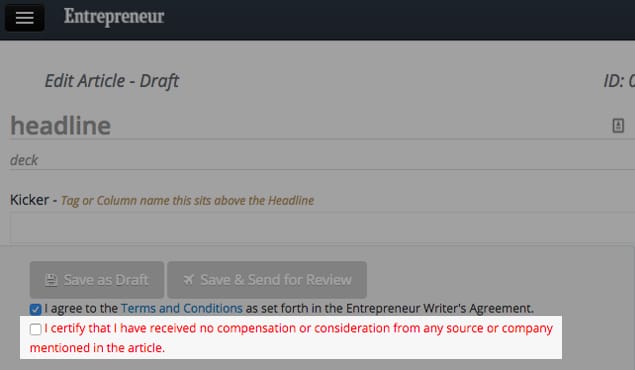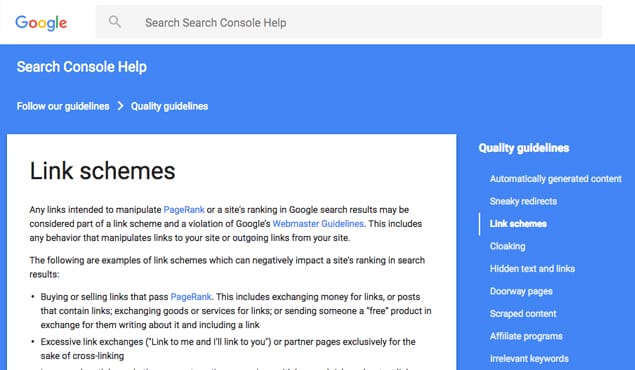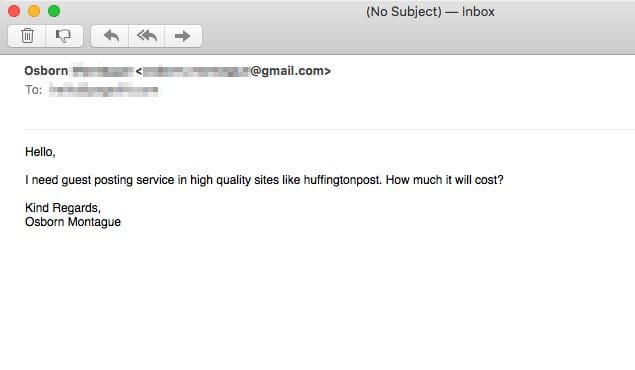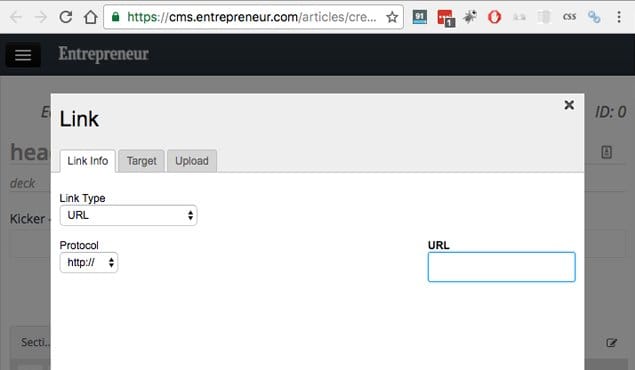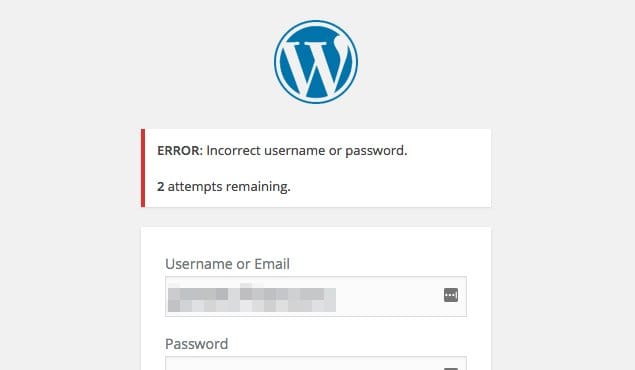There’s a lot of negativity in the guest post world. When Google decided to declare a mini-war on the whole process back in 2014 a large message was sent to content creators everywhere — don’t guest post for money!
Of course money is the end goal of a guest post, so what Google actually declared war against was backlinks that provided no value to readers.
See, backlinks help with search rankings, search rankings produce traffic, and traffic means money. The link is clear cut and proven time and again by internet marketers; if you build your position in search, you can make more money.
Guest posting became — and in many ways still is — a scapegoat in this scenario.
Google and search engines blame guest posting for saturating an otherwise legitimate backlink filled internet with spammy links for websites that should never rank highly because those sites suck at providing information … to put it bluntly.
Yet that doesn’t mean we should drop a blanket on the embers of guest posting and extinguish the whole thing.
That makes no sense, because guest posting has always been and will always be an incredible way to grow a community, connect with a niche, and highlight unique content from exciting sources.
The Dark Path of Selling Links
The point of this article is to steer you away from selling links on your guest post profiles, which is the very heart of the issue Google took up arms against in 2014.
Clearly, it’s still a ripe topic because you’re wondering if you should be trying to turn your guest post into a chunk of cash.
You should in some ways, and you should definitely not in others.
Defining the Selling of Links
To get into this further we need to talk about backlinks, and what companies do to get them.
Let’s pretend that, in the scenario for this article, you are an author with your own blog about iOS application development. You’ve had some success and have created guest posts for at least two other blogs, both of which are decently popular. You have also been asked to contribute content to a large-name online magazine, like CNet (because you’re so good at technology and business).
Whatever your actual scenario is, think about the above role-play when applying this article to yourself.
Writing Posts for your Blog
You still regularly write articles for your own blog. That’s how you got your name out, and you have a sizable readership that waits to hear what you have to say.
You write an article a week about what you’re working on, one about new developments in the industry, and another answering questions from readers.
Just about every day you receive a new email in your inbox from a company in the app development world asking you to “review” their product.
Review, in this context, means they will provide the product to you for free and ask that you (hopefully) write a review about it. If they are scared about getting bad press, they will ask to read your article before it goes live.
This is your blog — you can respond to them however you want. You can give them a great review or a terrible one, you can ignore the email or build a relationship with them.
If you do write a review for them, you’ll have to note at the bottom that the product was given to you for free — that’s the law. If they paid you any money for the review, you’ll have to state that as well, and make it clear in the post that money exchanged hands. This falls in line with a “sponsored” post.
In short, you provide press for the company, and you probably will link to their website at least once.
This backlink, beyond the press and views from your readers, is what the company is looking for. You pass search juice to them through your review, their rankings go up in Google, all while getting good press (even if it’s bad press, it’s press!) and making an industry connection.
Now you know why companies send emails like that.
Writing Guest Posts for a Blog
This process changes when you write a guest post.
A guest post, by definition, is when you write an article for another blog or online publication and get attributed for that article in your byline.
It’s not ghostwriting, and it’s not really a collaboration (though this has more wiggle room).
As such, you will usually get a guest post profile when you write your first post at a new publication. At a larger publication this will be an author profile, sometimes called a contributing author, and you’ll get your own URL on the site.
Your guest post profile typically carries your name, your image, and a short blurb about your career. It’s a byline, but also carries some weight in Google and should represent you in the online sphere.
Backlinks in Guest Posts
Assuming you’ve gotten to a decent-sized readership in your field, you’ll already know that guest posts should include backlinks.
Any good article includes backlinks, because those are just hyperlinks to other articles that provide great information. It’s an online version of citing your sources while also expanding readers’ knowledge of publications.
The key here — and everywhere that talks about backlinks — is that those links should be relevant. Relevant to your readers, relevant to the topic you are writing about, and relevant to your general niche.
You should only link to sources that, when clicked, will greatly inform your reader and back up a point you have made. Google highly promotes this version of the backlink — it’s what made the search giant famous.
The other version, in which your backlinks are not relevant, provide nothing for the readers, and only serve you and your money-grubbing hands, are not going to be tolerated.
Money, Backlinks, and Guest Posts
The complication of this process happens when money gets involved, and based on the clear line from backlinks to money that I mentioned earlier, it’s always involved.
When you write a guest post you need to be even more thoughtful of the backlinks you include for this very reason.
Scenario One – Legit
Let’s imagine a scenario:
CNet has asked you to write an article on the top ten development strategies for bootstrapping apps. You go about penning this article, making it awesome-sauce, laying out your points clearly, with flair, and finish up tidily.
You then look into providing hyperlinks to support your ideas, or include companies that are doing what you’re writing about.
You do the research yourself, cite who you want, and submit it.
No sweat off your back.
Scenario Two – Sketch
Now let’s take the same scenario and article topic and throw in a wrinkle.
After you get this assignment from CNet you open your inbox and find a company that highlights a new development strategy for bootstrapping apps. They want you to include their company in one of your posts, and will pay you $150 to do it, for a backlink (of course).
They also know you occasionally write for CNet, and will pay you $300 if you include them in an article published on CNet.
You can begin to see how this is sketchy, feels wrong, and doesn’t add up.
If you had heard of this company before, or checked out their project and really think it’s amazing, feel free to write your own article as a sponsored post and take the $100. If you want to include it in the CNet article, by all means go ahead.
But you can’t take the money.
You’d have to legally tell CNet, who then would have to brand the post as sponsored content, and no self-respecting publisher is going to allow a guest post to include sponsored content when they’re not making any money.
There are tons of ethical issues here, and just plain-old deceit.
If you take the $300 there will be a statement somewhere in your history that you’ve done this (unless they pay cash, which doesn’t ever happen), and that isn’t a good thing.
The Consequences
I hate to be the bearer of bad news, the one to tell you can’t make a bunch of money by writing guest posts and never telling them about your sponsored links, but it looks like I’m that person today.
Sorry.
There are two major consequences to performing these actions.
1. Banned Guest Post Profile
The first is that if you’re ever found out by your publisher, they will ban your guest post profile and delete your content (or attribute it to someone else). This means your byline will go away, your link juice from that site will go away, and you will be blacklisted in the community.
In the above example, you’d be blacklisted by CNet, which is a major organization. It’s not something you want to have happen.
2. Google Penalties
The worst aspect of this is if Google ever combs through your article and deems the content to be spammy. Hopefully you’ve written a decent article and at least included the product because you thought it was good, but if you haven’t, or even if you were over zealous with your backlinks, Google can issue a penalty.
They will issue the penalty to the website, not you.
This will feel like you’re off scot-free until CNet emails you asking why they received a Google penalty for your article — “what’s with the backlinks??” they will say, and No. 1 will then ensue.
It’s a bad idea, all around.
Be Better, Be Honest
The truth of the matter is that if you want to be taken seriously in the world as an author you’re going to need to do the hard and real work of evaluating how you make money in addition to writing excellent articles.
If you decide to take money from a company, make sure you let your readers know completely, and only do it on your own blog.
Likewise, if you don’t feel a product is worth reviewing, consider forgoing the money offered because it won’t, in the end, increase your readership and authority.
Remember that, in most circumstances, no single amount paid for an article is going to be worth the continued development of your reach as an expert in a field.
Legitimate Profit
By writing articles on relevant subjects, providing unique insight for your readers, and connecting with others in the industry you will grow your blog into legitimate profit machine.
Being paid as a contributing author will not just be a small monetary reward for a couple hundred (or thousand) words, but will continue to give you link juice and increase your own blog’s relevance.
If you haven’t already turned your blog into a money-making vestibule, do so with native advertising, banner ads, or specifically sponsored sections and giveaways.
There are countless ways to make legitimate profits in the field of blogging and guest blogging, but getting paid behind the scenes for backlinks is not a good one.
 ContentPowered.com
ContentPowered.com
